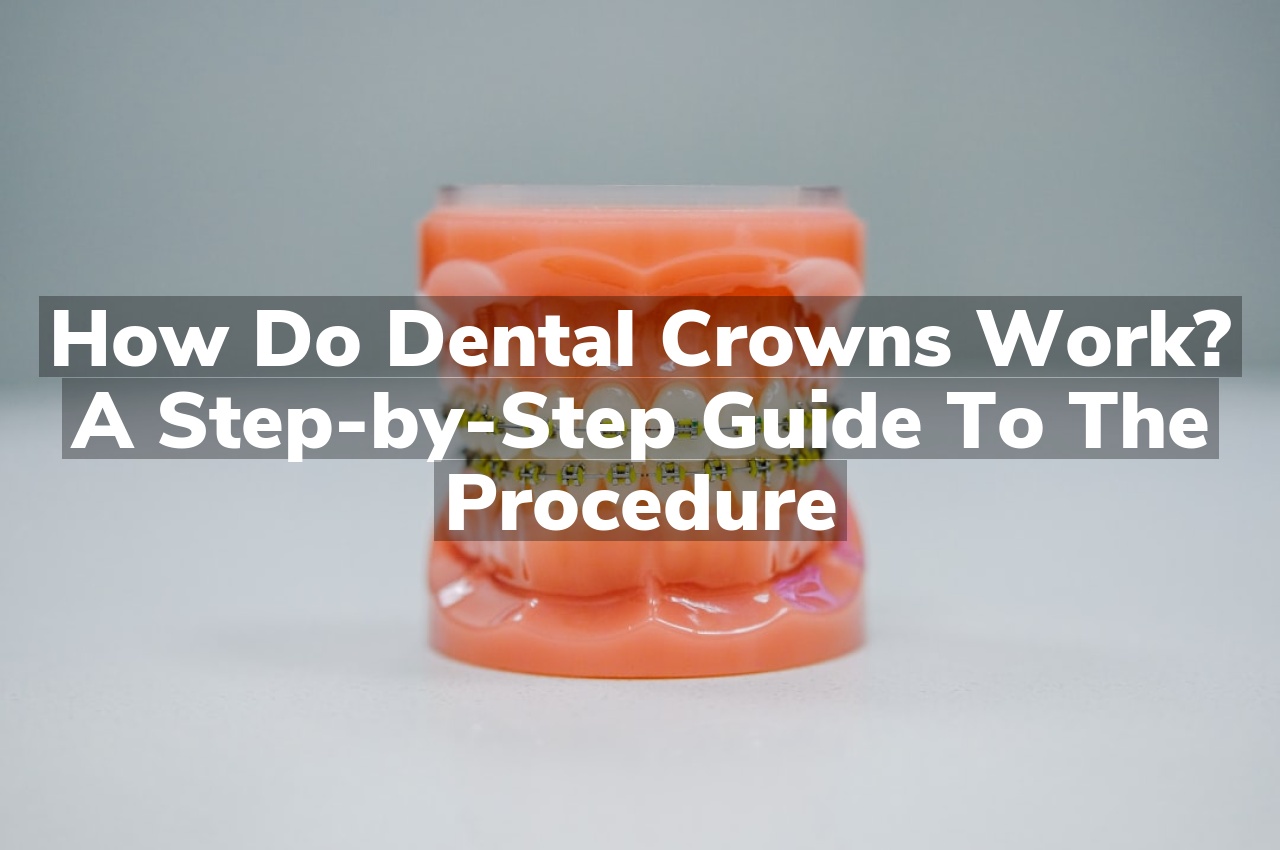How do dental crowns work, and what can you expect during the procedure? Dental crowns are custom-fitted caps placed over a tooth to restore its shape, size, and strength, effectively enhancing its appearance and functionality. The process typically involves preparing the tooth, taking an impression, and finally, fitting the crown during subsequent visits to the dentist.
Understanding Dental Crowns
Dental crowns are a common solution for restoring the function and appearance of damaged teeth. When asking “Do dental crowns work?”, it’s important to understand their primary role in dental care. Essentially, a crown is a cap placed over a tooth that has been prepared by a dentist. It is designed to protect the tooth from further damage while restoring its shape, size, and strength. Crowns are used in various situations, including covering a dental implant, restoring a broken tooth, or supporting a tooth with a large filling when there isn’t much of the original tooth left.
Crowns can be made from different materials, each chosen for its durability and aesthetic qualities. For those curious about the specific materials used in the creation of dental crowns and their advantages, further information can be found by exploring What Are Dental Crowns Made Out Of? A Look at the Materials and Their Benefits. This resource provides detailed insights into the various options available and their respective benefits in dental restoration.
Initial Consultation and Examination
The first step in understanding how do dental crowns work involves an initial consultation and examination with a dental professional. During this phase, the dentist assesses the health of your teeth and gums to determine if a dental crown is the appropriate solution for your dental needs. This examination typically includes X-rays and detailed inspections of the tooth or teeth that may require crowning. The goal is to ensure that the structure of the teeth and surrounding tissues are healthy enough to support a crown.
Throughout this process, the dentist will also discuss your dental history and any symptoms you might be experiencing that could influence the decision to proceed with a crown. This is a crucial step to identify any underlying issues that might affect the longevity and effectiveness of the dental crown. To learn more about the different types of materials used in these procedures, you might want to read What Are Dental Crowns Made Out Of? A Look at the Materials and Their Benefits.
Tooth Preparation Process
The Tooth Preparation Process is a crucial initial step in understanding how do dental crowns work. This phase involves reshaping the tooth to ensure a proper fit for the crown. The dentist carefully modifies the structure of the affected tooth, removing any decay and reshaping the surface. This preparation is essential to create an optimal base for the crown, which will be designed to match the size, shape, and color of your natural teeth, ensuring a seamless integration into your smile.
Taking Dental Impressions
Taking dental impressions is a crucial step in the process of how do dental crowns work. This procedure involves creating a mold of your teeth, which serves as a blueprint for crafting the dental crown. During this stage, a dentist uses a special material that captures the shape, size, and details of the affected tooth and surrounding teeth. Once the impression is set and removed, it is sent to a dental lab where the actual crown is made to fit perfectly over your existing tooth. For those interested in learning more about dental procedures, Alliance Dental Care is a great resource. Visit this Meridian Dentist for more information.
Crown Design and Fabrication
The process of crown design and fabrication is a crucial step in the creation of a dental crown. Initially, after preparing the tooth, a dentist takes an impression, which provides the exact mold for the crown. This impression is then sent to a dental laboratory where the actual crown is crafted. Technicians at the lab use the impression to match the shape, size, and bite of the tooth to ensure the new crown fits perfectly in the patient’s mouth. The materials used for the crown can vary, typically including porcelain, ceramic, or metal alloys, each selected based on where the crown will be placed and the functional needs of the tooth. Once fabricated, the crown is sent back to the dentist’s office for the final fitting and adjustment.
Temporary Crown Fitting
After your dentist prepares your tooth for a crown, a temporary crown is fitted to protect the tooth while your permanent crown is being made. This step is crucial in ensuring that your tooth remains safe from further damage and sensitivity. The temporary crown also helps maintain the space left by the tooth to prevent other teeth from moving out of place, which could affect how your final crown fits. During this phase, patients often wonder, “Do dental crowths work effectively even with a temporary solution?” The answer is yes; the temporary crown is an essential part of the successful dental crown procedure, providing stability and protection until your permanent crown is ready for placement.
Permanent Crown Placement
Once your tooth is prepared and your temporary crown is removed, the next step in understanding how do dental crowns work involves the placement of the permanent crown. During this crucial phase, your dentist will carefully position the custom-made crown over your tooth to ensure a perfect fit and alignment. The crown is then cemented into place, creating a strong bond that secures it to your tooth. This process not only restores the functionality of your tooth but also enhances its appearance, giving you a natural-looking smile. Proper placement is key to ensuring the longevity and effectiveness of the crown, making it a critical component of the dental crown procedure.
Aftercare and Monitoring
Once your dental crown procedure is complete, proper aftercare and monitoring are crucial to ensure the longevity and effectiveness of your treatment. To maintain your new crown, regular brushing and flossing are essential. Avoid chewing hard foods or ice to prevent damage. Additionally, regular dental check-ups are important to monitor the crown and surrounding teeth to ensure everything is functioning correctly. These steps will help you answer the question: do dental crowns work effectively in the long term? By following your dentist’s advice and maintaining good oral hygiene, you can enjoy a healthy, beautiful smile with your new dental crown.
Longevity and Maintenance of Crowns
When considering the effectiveness of dental crowns, a common question is: how well do dental crowns work over time? Typically, dental crowns can last between 5 to 15 years, but with proper care, their lifespan can extend up to 25 years or more. The longevity of a crown depends largely on good oral hygiene practices and avoiding habits that could damage the crown, such as chewing ice or hard candies. Regular dental check-ups are crucial as they allow your dentist to monitor the condition of your crown and address any issues before they become major problems. Proper maintenance not only ensures the durability of your crown but also supports overall dental health.
Conclusion
Now that you understand how do dental crowns work, if you have further questions, feel free to call us at 208-646-9461 or read our reviews on Google Maps.




